UP Skills Summit 2016 was organized by Confederation of Indian Industry (CII) and Uttar Pradesh Skill Development Mission (UPSDM) on 27th June 2016, at Lucknow. The event saw active participation from speakers, panelists and attendees. Out of the 200 participants, 130 were industry representatives, 30 government officials and 40 UPSDM training partners. The main theme of CII UP Skills Summit focused on building a skilling ecosystem in UP through training, job creation and entrepreneurship besides NSQF adoption in schools.
Inaugural session of CII UP Skills Summit
In his opening remarks, Atul Mehra , Chairman – CII U P State Council and Managing Director – Tasty Dairy Specialties Ltd , gave an overview of CII’s role in anchoring skill development by working closely with the government at the center and state levels. He also spoke about how CII has taken ownership of upgrading the ITIs, capacity building, improving infrastructure, apprenticeship, promoting skills competitions, forming sector skills councils.
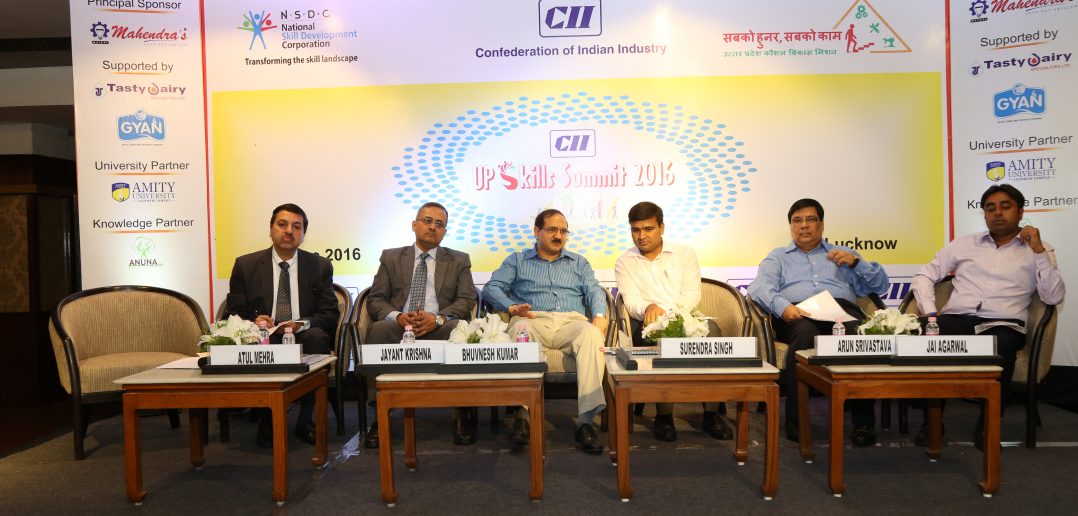 Arun Srivastav, Chairman UP Skills Summit & Chief Mentor – Anuna Education, while setting the context, emphasized on NSQF adoption in schools in UP. He also presented the highlights of NSQF such as the focus on outcomes through Qualification Packs (QPs) and National Occupational Standards (NOS), Recognition of Prior Learning (RPL), Labour Market Information System (LMIS), assessments and the ability to connect education and training with work mobility and international parity.
Arun Srivastav, Chairman UP Skills Summit & Chief Mentor – Anuna Education, while setting the context, emphasized on NSQF adoption in schools in UP. He also presented the highlights of NSQF such as the focus on outcomes through Qualification Packs (QPs) and National Occupational Standards (NOS), Recognition of Prior Learning (RPL), Labour Market Information System (LMIS), assessments and the ability to connect education and training with work mobility and international parity.
Delivering the special address, Jayant Krishna, CEO, NSDC, gave an overview of skilling ecosystem in India and CII’s pivotal role in evangelizing skills in India. He strongly argued or better compensation as a major differentiator in making skills aspirational and overcoming social stigma attached to vocational education. He expressed the need to need to fast track the rollout out NSQF that helps in vertical and horizontal mobility of students. Emphasis on ITIs to correct the imbalance in engineering education, how UP can take the lead, promote PPP mode of working in achieving targets with quality – reinvent employment exchanges, vocational education in schools were some key takeaways from this talk.
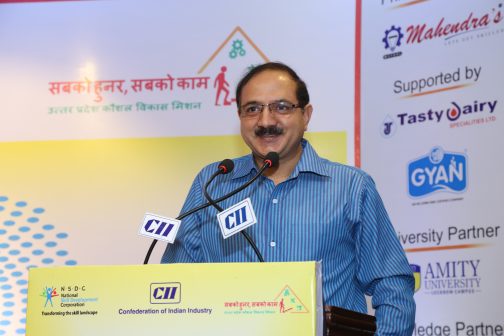
Bhuvanesh Kumar – Secretary – Skill Development & Vocational Education, Govt. of Uttar Pradesh discussed how vocational education is not aspirational and it becomes the last recourse. This has to do with the wages and salaries for skilled jobs that don’t attach high esteem. He mentioned that while 36 lakhs appeared for UP board exams only 3 lakhs were from the ITIs. This means 92% prefer conventional education since there are no provision pathways for higher education after ITI. In 2014, 46,000 seats available in government ITIs and today they have 1,00,5000 seats. He also spoke about the 80 new ITIs and measures takes to promote teachers, create additional posts and administrative support while advising the private training partners to position themselves as placement agencies for better results of skilling.
The inaugural session closed with a vote of thanks from Jai Agarwal, vice-chairman – CII UP State Council & Director – CP Milks & Food.
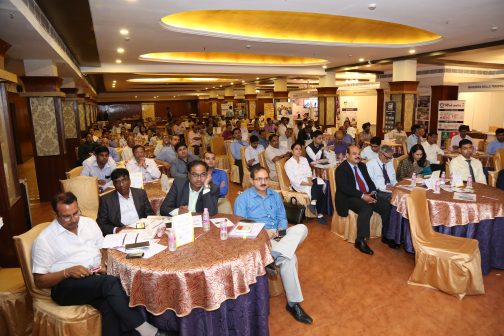
The inaugural session was followed by presentations from the government and the industry.
Dr Surendra Singh, IAS, Project Director, UPSDM, spoke about the challenges in skill development such as placement, meeting the industry demand etc. He stressed on making all training programs NSQF compliant and the need for MES courses to be brought into the NSQF. Besides, the addressed like the role of training partners, mobilization challenges, assessment delays and the promotion of residential programs to meet the attendance criteria and quality along with TOT programs.
Kumar Lalit – HR Head, Tata Motors, Lucknow, discussed various aspects of apprenticeship and training. The Lucknow manufacturing plant of Tata Motors specializes only in commercial vehicles production. They enrolled 532 apprentices this year (18% were women) – after 2 years at ITI; there is lot of focus on new technology such as air suspension, CNG in the training. Besides technical trade skills, he spoke about the need to train in allied skills such as safety, communication, behavioural skills, ethics, discipline etc. The apprentices maintain work diaries and the ITIs have a smart classroom. The apprentices are sent to national skills competition provided they qualify in the regional competitions.
Mr Amit Kaushik: Practice Head – IPE Global, talked about the significance of industry support for skilling in UP since it has high levels of migration for education and employment. He discussed about the industry in UP – tourism, construction, sugar, textiles, handicrafts – now biotech, power, health and transportation. Skill development is only one half – the other half refers to job creation – hence industry has an important role to play – they should promote skilled and certified people. But they are not yet convinced to pay higher wages; there’s a need for legal support for industry to hire skill certified people and set up industry cells for keeping up with technology upgradation.
CII UP Skills Summit panel discussion
The panel discussion on entrepreneurship was chaired by Mr Ajay Mohan Goel, co-founder and Principal Consultant Skills Management Group Pvt Ltd. He presented the unique position of UP as one of the most populous state with tremendous scope for business and entrepreneurship. The panelists expressed their views on connecting national mission like Start Up India Stand Up India, Make in India with MUDRA loan Scheme providing loans to people to start their own businesses. They also discussed the scope for teaching entrepreneurial skills in schools and ITIs in urban and rural areas.
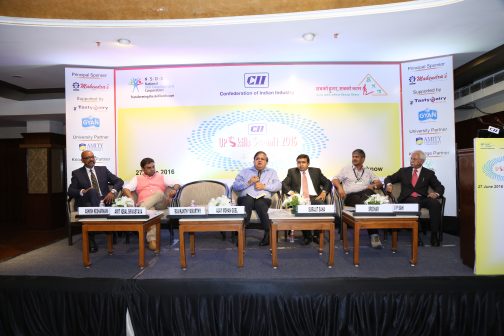
Ravikant, Head of Assessment and Training at Logistics Sector Skills Council spoke about how perceptions have changed in logistics sector, which was earlier not considered aspirational. The sector has good industry involvement and support; it has 23200 enrolments in PMKVY. The sector has defined 36 job roles training curriculum and content. The sector aims to provide end-to-end solutions starting with mobilizing people. He also spoke about the scope for ecommerce training for higher NSQF levels, multiskills centers, involving ex-servicemen as assessors working closely with empanelled assessment agencies, various MoUs for placement support.
Surajit Saha, L&T, Lucknow, emphasized on strengthening the credibility of skill ecosystem. He brought in the industry perspective with the need to prepare the workforce with appropriate skills and create jobs. The basic requirements is to be able to sell oneself, and convince the recruiter to hire. The end result of all training should job placements that cater to changing market requirements. He gave details about how L&T in UP has initiative with 8 training institutes taking 100 people every 3 months.
B. Sridhar, Bankers’ Institute of Rural Development (BIRD), Lucknow, talked about the financial training requirements for NGOs and social enterprises. He pointed out that stress on higher education has led to problems in rural employment, migration. MSME is the major employment generator with specific challenges pertaining to women, SCs, and first time entrepreneurs. MSME high opportunities with easy access to loans, credit
Amit Iqbal Srivastav, CEO, Anuna Education, reiterated the significance of entrepreneurship training and the role of MSDE in advocacy and support. Though entrepreneurship cannot be taught in an MBA programs, there are ways to provide practical handholding with exposure to real business environment. He was positive about the role of ecommerce certification in creating awareness about new business domains.
V P Sahi, Director, Amity University, brought out the need for education to support entrepreneurship and how it can be a complementary system with suitable curriculum and pedagogy with the help of industry. Industry has to become an equal partner in higher education and entrepreneurship – successful entrepreneurs as teachers. He reiterated that entrepreneurship is not a skill and it cannot be taught. It need tremendous capacity for risk taking, be able to accept repeated rejections, decision maker can’t be a fence sitter, be a team player, unconventional thinker and creating favourable environment for starting on one’s own.
Ashish Kesharwarni, CEO, Model Career Center – CII, expressed the need for inculcating a culture of counselling. In India, counselling has a negative connotation even though there is a need for career counselling that could benefit the youth and influence the parents. He stressed on assessing the aptitude and then guiding the students for careers, working closely with placement and skill development partners. The students should be able to express themselves, perform on the interview since 85% get rejected in the first impression. They should be able to demonstrate skill and knowledge through effective communication – combining people skills and technical skills.
Mr Ajay Goel summarised the summit talking about the salient features of the session and thanked all the stakeholders. He appreciated the efforts of CII in organising the first evert skill summit in UP.




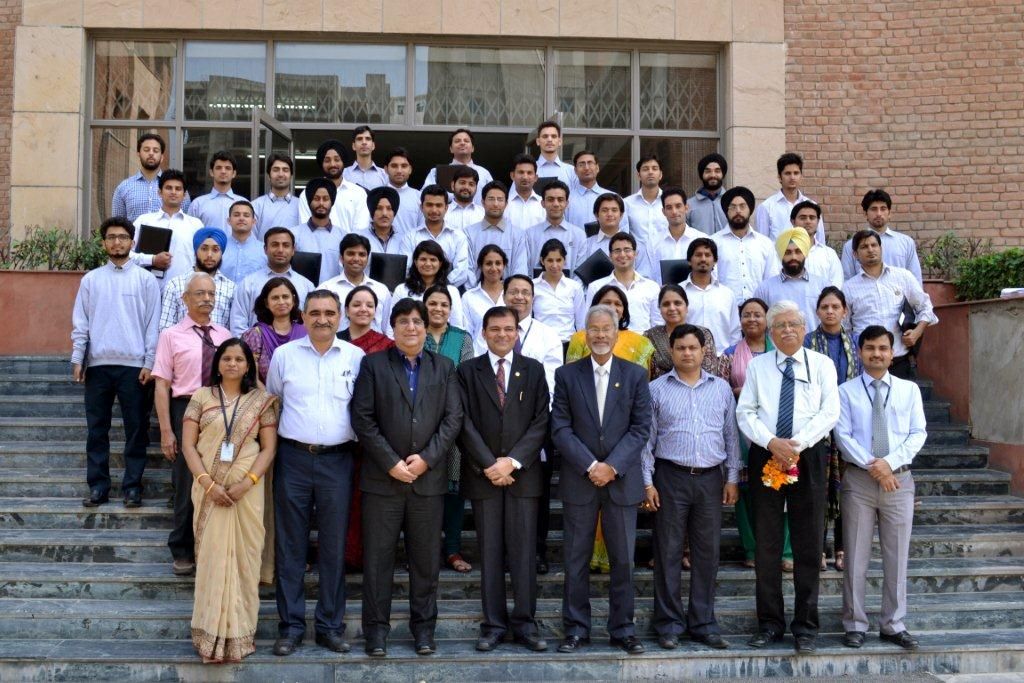









Comments 1